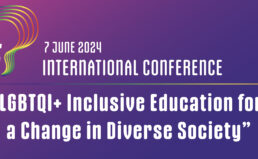
“Lithuanians would like to not see gays in public, but a large majority of Lithuanians reacts calmly to a march with such slogans as “Lithuania- for Lithuanians”. Westerners on the other hand are of an opposing opinion- gay parades are good, but the nationalist parade should elicit a serious response” – well known Lithuanian journalist Ramune Sotvariene says.
So which parade should be prohibited- the gay one or the neo-Nazi one? Maybe both? Or neither?
The nationalist parade that happened on March 11 does not make Lithuania beautiful. If the young nationalist’s statement is translated it ends up that Russians, Jews, Poles, as well as British and French, along with other foreigners have to leave Lithuania.
To make sure that these people do not decide to come back, a spiked fence should be erected. But before that- European Union should be left. Then Lithuanians would then have nothing to fear. Well, maybe each other.
But would it be better if this nationalistically minded youth along with a few politicians would meet somewhere in the dungeons to discuss how to fight the government which forbade them to express their separate opinion?
It is an uneasy question. Especially if one looks for an answer in the not always pleasant historical Lithuanian and other context. After all the bloody Nazi march started from supposedly innocent nationalist slogans.
On the other hand, prohibition does not eliminate the problem. Quite the opposite. Often it makes the problem bigger. It gathers and infuses extra energy.
Banning means not knowing. When we will not know, we will not be able to evaluate, discuss, or change that which is unacceptable or even dangerous. We will not notice when the barrier was crossed.
That is why foreign representatives are absolutely right: today the bigger problem is not the nationalistic parade in itself, but because politicians participated in the preparations. However, neither the Lithuanian society, nor the political leaders react to this event in any way.
Are they afraid of something? Did they contract a yet unknown phobia?
Every irritating event, and especially one clawing into the opposing camps should evoke their words. Talking is a tested means for fostering values and for forming of attitudes. After a prolonged silence speeches may no longer be enough.
Political leaders were silent about the gay question, which left the door open to homophobes.
Member of Seimas, Petras Grazulis, was even able to compare gays with pigs. Pigs, it appears are better defended than people by the European Union. He is a member of Seimas Committee on Science, Education and Culture.
Julius Veselka considers the defense of gay rights, a part of the human rights, a butt philosophy. He is one of the fifty Members of Seimas who signed the petition to ban the parade.
The signatures were not just sent anywhere but to the Prosecutor General’s. In other words, the Lithuanian state is invited to stand against the sexual minorities with full force.
In terms of European values, public nationalist and sexual minorities’ events are two completely different things. Nationalism pushes people aside and there is always a possibility of it becoming a force for destruction. All homosexuals want is to be valued just as everyone else.
And especially this aim, and not the one of potential neo-Nazis, provokes aggressive reactions. An articulate fact. It proves that homophobia especially is a big problem in Lithuania.
Various fears of phobias, superstitions, imprisons a person in his own mind. 20 years ago Lithuania ran away from a prison where there were no gays because there could not be any. But the superstitions were brought along.
Their chained society is not free. They work as breaks that repels, that leaves marks in laws and people’s relationships.
How to change that? How to foster a perspective in this European Union state that sexual minorities are are a part of society- with full rights and harmless?
People are afraid of that which they don’t recognize or understand. And they don’t understand because they do not know. If they look more carefully they would see that now, just as through the ages, gays and lesbians live alongside them. They would find them in deep country and in their birth places. But they are afraid. Even when they feel it. Gays are equally afraid.
I might have missed a few things, but it is likely that the only public figure, Rokas Zilinskas, dared to openly reveal his identity and share his experiences.
Did anything happen? Nothing. No one condemned him. No one suggested removal from the Seimas. A gay or lesbian acquaintance is not even scary to P. Grazulis and J. Veselka.
That is why a gay parade in Vilnius is necessary. It is needed for them more than for us. For us to see with our own eyes that they do not have horns or devil’s tails. To affirm: homosexuality is not swine flu. It is not contagious or deadly. Indispositions trouble them as much as anyone else.
Today, even more than a month ago or last year, I want the parade to happen. I wonder how many homosexuals aware of the dominant Lithuanian opinion will brave the public march. A few dozen, a few hundred, or maybe a thousand?
Not less interesting is how will they display their different identity. Extravagantly, like, say, in Berlin? Maybe similarly to Latvia. Or something else entirely?
Even more interesting, how will the guards of public security behave. Will they realize the responsibility of defending everyone equally at a public event as long as it is peaceful and in accordance with law.
The largest intrigue- reaction of the society. First event of this kind should attract many curious observers. Who knows if they will only watch or maybe stare down at the parade, or indulge in snide remarks?
Maybe superstitions will win, the mass will move to beat the “evil” that surfaced in the daylight.
None of this would say anything new about the gays. Everything that would happen would be about us. We have already found out a few things. The permit to organize a parade is a big step that liberates one from superstitions.
However, by making that step, the mayor of Vilnius, Vilius Navickas, tried to be a European and a traditional Lithuanian at the same time.
The permit was granted, but moved to the least observable location. This is very Lithuanian-like: let it be, as long as it is not directly in front of one’s eyes.
But even that did not work out; the Department of Cultural Heritage awoke. When others tread on the same spot, when close by illegal races are organized the guards of Lithuanian heritage sleep calmly.
But gays, after all, are something else. What is allowed to other, is not allowed to gays in Lithuania. By trying to defend his decision, the mayor ended up, it could be said, in deep waters.
“The permit entirely reflects the essence of Christianity- to commiserate, not to punish. The city does not push away its people no matter what trouble they might be in, how ugly or stricken with an ailment” the mayor was trying to appease the enemies of the gays.
There is an attitude among traditional Lithuanian males: let them live and sleep with whomever they want. But quietly, and even better- secretly.
Everything will be okay as long as they do not advertise, do not walk around holding hands, or boast when searching for a job. We will pretend that they do not exist, and they will pretend that they live like they would want to anyways.
The majority that thinks this way believe themselves to be entirely tolerant. They do not understand what else is needed. Not even that much is necessary. The same as everyone else. To be able to be oneself anywhere, anytime and not to be afraid. Not to be afraid to be thrown out of a group of friends or fired, to be scorned, or pitied.
Many seem to understand already: homosexuality is not a perversion, it is decided by nature. With difficulty, the realization is also appearing that a gay man, and a pedophile are two different things. Pedophiles are usually members of what is called the traditional sexual orientation. Is it because there are more of these people?
However minorities are not perceived the same as everyone else. Where is the dividing line?
Public events are one of the ways to comprehend. When the permit to organize a gay parade and the parade itself will cease to elicit exceptional passions, when it will be just another city event to the society of traditional orientation, when not one or two gays and lesbians will no longer fear to be who they are, then we will be able to say that we have reached the level of European tolerance.



